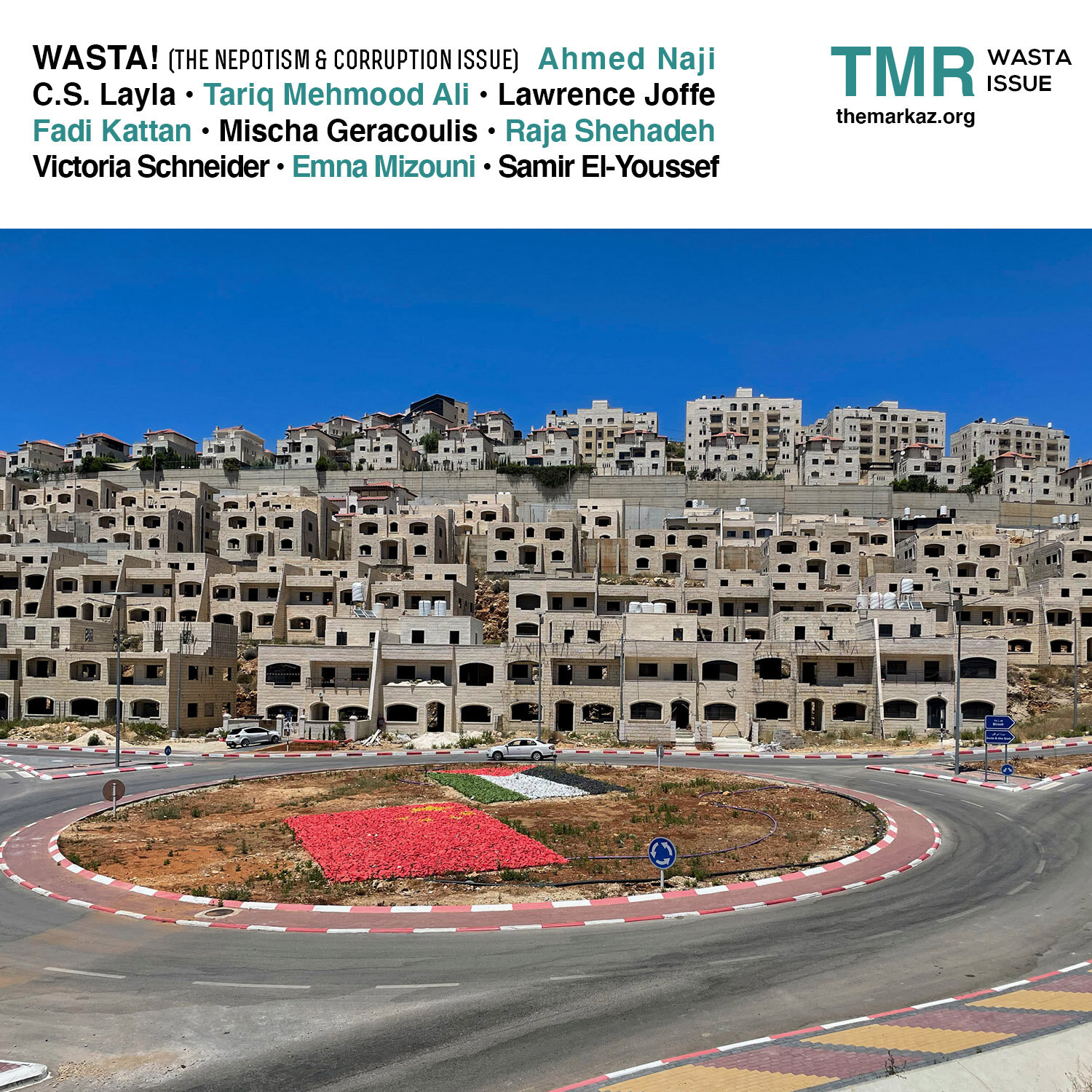
Photo of The Diplomats’ Quarter north of Ramallah by Bassam Almohor.
Tribal Arab culture didn’t invent nepotism and corruption, but it did develop a complex system of wasta. As Aseel Zimmo writes in the Arab Law Quarterly, in a paper titled “Wasta in Jordan: A Distinct Feature of (and Benefit for) Middle Eastern Society”:
Wasta means both the well-connected, personal intermediary-intervener and the process of inter-mediation-intervention…Wasta literally means the middle and is associated with the verb yatawassat, to steer parties toward a middle point or compromise. Wasta refers to both the act and the person who mediates or intercedes. Wasta has been an institutional part of Jordanian society since its creation. Its tribal origins centred on an intermediary role that is associated with prevention of retaliation in inter-personal or inter-group conflict.
However, while wasta may have originally involved mediation and conflict-resolution, it has evolved into a malignant Hydra in many countries the world over — what no wasta? no connections? Then you don’t have the clout to get what you want.
Wasta via its ex-warlords has certainly been costly for Lebanon, as novelist Samir El-Youssef observes in Lebanon’s Wasta Has Contributed to the Country’s Collapse, where he recalls adolescent challenges and more recent experience in which wasta was a necessity (see also Lebanese Oppose Corruption with a Game of Wasta by Victoria Schneider). After surviving an Egyptian prison and obtaining asylum in the United States, writer Ahmed Naji contemplates wasta and standing in line in I Love Wasta and Hate Standing in Line, but I am Poor (translation by Rana Asfour). And Middle East historian Lawrence Joffe looks at how the al-Assad and Makhlouf families have mastered the art of control and corruption in a country decimated by a decade of war, in Syria’s Ruling Elite — A Master Class in Wasta.
Lest we delude ourselves into thinking that wasta-level corruption is exclusive to the Arab world, contributing editor Mischa Geracoulis discovers the film Push and explores the incredible greed and inequity of the speculative housing market, particularly in the US and UK, in Wasta on Steroids: Speculative Finance & the Housing Market. She establishes that “dark buildings” and tax avoidance/tax evasion are universal phenomena which exacerbate homelessness, denying to millions what the Universal Declaration of Human Rights says is a human right: having a home.
Two contributions critique wasta outcomes in Palestine, when author and attorney Raja Shehadeh recounts the legend of a ritzy Ramallah neighborhood, designed for heroes of the PA, in The Diplomats’ Quarter: Wasta of the Palestinian Authority. And Bethlehem chef Fadi Kattan recalls the disaster of wasta leading up to Christmas Eve at Fawda restaurant, in Wasta Tawla, or how the Wastafarians Fared at Fawda.
Our correspondent in Tunis, Emna Mizouni, reports on the vaccination crisis exacerbated by wasta, in In Tunisia, Wasta Kills When It Comes to Covid-19.
TMR 10 rounds out with two well-told accounts — novelist and filmmaker Tariq Mehmood weaves a tale of wasta, women and booze in Rawalpindi, in Pakistani Bureaucrats & The Booze Permit, while C.S. Layla, the American daughter of a Jordanian professor, remembers life and wasta in the old country, in Vitamin W: The Power of Wasta Squared.
We invite you to read, comment on and share these contributions, in the search for a better understanding of the nepotism and corruption plaguing societies east and west.
—Jordan Elgrably, editor




